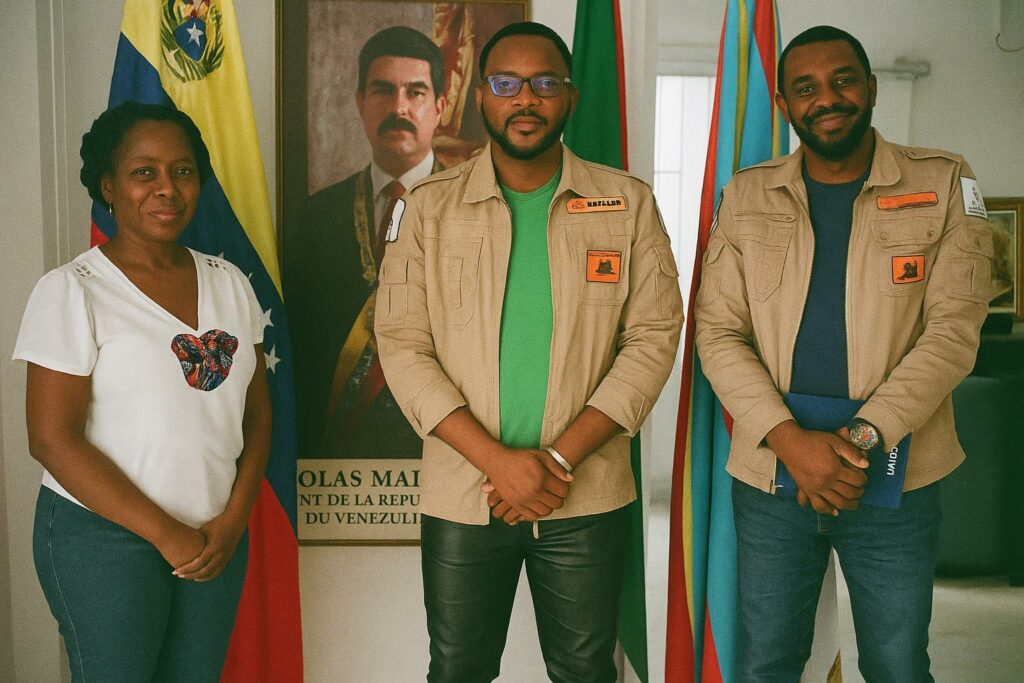Diplomatic Tourism as a Vector of Soft Power
Few bilateral dossiers illustrate the changing grammar of South–South relations as vividly as the emerging tourism dialogue between the Republic of Congo and the Bolivarian Republic of Venezuela. In a recent audience at the Ministry of Foreign Affairs in Brazzaville, Ambassador Laura Evangelia Suárez underscored the “necessity of embedding Venezuelan tour operators in the Nabemba Tourism Expo 2025 platform so that Caracas can participate from an informed, operational standpoint.” Her wording, carefully calibrated, reflects a broader diplomatic calculus: tourism is not merely an industry; it is an instrument of soft power, reputational branding and environmental governance.
The Nabemba Tourism Expo 2025—named after the country’s highest peak—has been positioned by Congolese organisers as a continental rendez-vous that will showcase the Congo Basin’s ecological wealth while amplifying South-South economic corridors. According to the Congolese Ministry of Tourism, the Basin accounts for nearly 10 % of global tropical forest cover, an asset increasingly salient for climate finance discussions (Ministry of Tourism, 2023). Linking that biodiversity narrative to Venezuela’s own catalogue of tepuis, mangroves and Caribbean coastlines furnishes a compelling storyline of cross-Atlantic ecological solidarity.
Why Nabemba Tourism Expo 2025 Matters for Brazzaville
Brazzaville seeks to leverage the Expo as a catalytic node within its 2022-2026 National Development Plan, which lists tourism among the top five non-extractive growth pillars. UN World Tourism Organization data show that international arrivals to Congo-Brazzaville rebounded to 62 % of pre-pandemic levels in 2022, yet the country still captures less than 0.5 % of African tourism receipts (UNWTO, 2023). In that context, securing a partnership with Venezuela—whose pre-COVID tourism income surpassed US $1 billion—offers both marketing reach and technical expertise.
Economic incentives aside, the Expo dovetails with President Denis Sassou Nguesso’s stated ambition of positioning Congo as a “laboratory of green diplomacy” within Central Africa. The presence of high-profile Latin American delegates would validate that aspiration while creating visibility for Congolese destinations beyond the customary safari circuit.
Venezuelan Expertise on Eco-Diversification
Venezuela’s own tourism diversification programme, VeneTour 2030, relies on community-based ecotourism, digital storytelling and public–private partnerships to revitalise local economies (Venezuelan Ministry of Tourism, 2022). Ambassador Suárez reminded her Congolese interlocutors that “Caracas has converted heritage towns such as Choroní and Mérida into living laboratories of inclusive tourism where climate education is integrated into every visitor experience.”
Such experience resonates with the Congo Basin context, where local communities act as custodians of biodiversity yet receive limited benefit from tourist expenditures. Involving Venezuelan tour operators in the Nabemba platform could transfer operational templates—ranging from waste-management systems to mobile booking applications—that have already been stress-tested in similar tropical environments.
Youth, Education and the Climate Agenda
Both parties have signalled that the partnership will hinge on professional training. National Coordinator Emerancy Francel Ibalank indicated that negotiations include twinning Congolese hospitality schools with Venezuelan institutes to deliver bilingual curricula on eco-guiding, heritage conservation and digital marketing. Such initiatives align with UNESCO’s call for greater vocational mobility within the Global South (UNESCO, 2022).
The climate dimension is equally prominent. Planned side-events at the Expo include river-bank clean-ups along the Congo River and technical workshops on measuring carbon footprints in tour operations. The symbolism is deliberate: it situates tourism not as an extractive visitation, but as a vector of environmental guardianship.
Prospects for South–South Economic Synergies
From a macro-economic angle, a Congo-Venezuela tourism corridor could attenuate both nations’ historical dependence on hydrocarbon exports. World Bank estimates place tourism’s direct contribution to Venezuela’s GDP at 2.8 % and Congo’s at just 0.7 %, figures dwarfed by oil revenues (World Bank, 2023). Yet cruise lines exploring the Gulf of Guinea, combined with Pan-Amazonian tour circuits marketed jointly, could nurture alternative revenue streams while enhancing currency diversification.
Furthermore, cooperation in visa facilitation—already under discussion at the consular level—would represent a concrete gain for tour operators. Digital visa platforms piloted in Caracas could be adapted to Brazzaville, reducing bottlenecks that deter high-spending travellers.
Charting the Road Ahead for the Brazzaville–Caracas Axis
Pragmatism will ultimately determine whether the memorandum of understanding, slated for signature by year-end, materialises into flight seats and hotel bookings. Success will depend on synchronising air connectivity, harmonising health-safety protocols and ensuring that local communities see tangible benefits—parameters that both sides appear ready to address in technical committees scheduled for the fourth quarter.
Yet even in its preparatory phase, the initiative accentuates a broader geopolitical nuance: African and Latin American middle powers are increasingly crafting bespoke alliances that circumvent traditional North-South aid paradigms. In the words of a senior Congolese diplomat, “What unites us is not only the rainforest canopy above our heads, but a shared conviction that prosperity and environmental stewardship are mutually reinforcing.” The Nabemba Tourism Expo 2025 could thus emerge as a stage where green growth narratives, cultural diplomacy and economic diversification converge in a distinctly southern key.
For Brazzaville, the dialogue with Caracas offers legitimacy and expertise; for Venezuela, it opens a gateway to Central Africa’s vast, under-explored market. For both, it illustrates how tourism—often relegated to glossy brochures—can serve as a disciplined instrument of foreign policy in a multipolar world.

